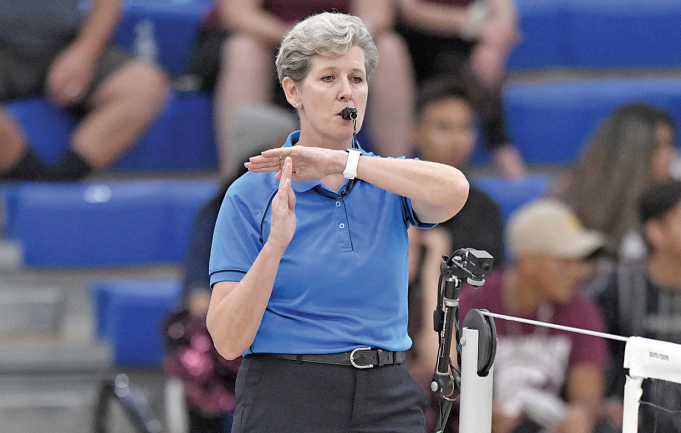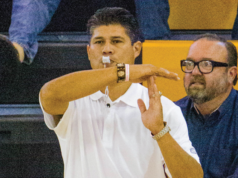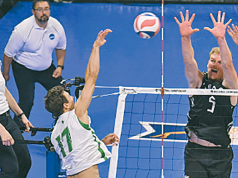The referees accept the coach’s or captain’s request for timeout and blow the whistle, starting the timeout procedure. Both teams usually move to the benches for a quick rest and to discuss strategy. Even fans take a break from cheering or make a quick run to the concession stand. A glance at the court will show the officials still standing and working. It is important to understand the responsibilities of officials during timeouts.
Of the officiating crew, the second referee usually has the most tasks to perform during timeouts. After going through the timeout procedures and signaling to the first referee how many timeouts each team has taken in the set, the second referee ensures nothing on the court needs to be addressed and makes his or her way to the scorer’s table to communicate with the scorer and assistant scorer. In this short meeting, the second referee verifies the score, how many timeouts and substitutions have been used by both teams, and if the liberos are on or off the court. This is also a good time to glance at the scoresheet and libero tracking sheet to make sure all of the match action has been recorded correctly. After these tasks are complete, as the timeout ends, the second referee will ensure all players are on the court and sound a warning whistle and horn when appropriate.
The first referee and line judges may have less work than the second referee during timeouts. The line judges walk to their timeout positions when the timeout is whistled and can take a mental and physical break. Usually the first referee will watch as the players move toward the benches. He or she may make a mental note of which team had liberos in the match when the timeout begins. The first referee might have a quick discussion with the line judges about a technique or call that needs addressing to improve the match moving forward.
During a timeout, all officials — line judges, referees and members of the scorer’s table — should find moments for a mental and physical break. Officials may use breathing or mind-clearing exercises, imagery or simply glance at a dancing fan for a mental break. Officials can physically shift their weight to take pressure off their feet, and utilize small stretching movements with the hands and discreet shoulder rolls to loosen the shoulders. It is important to take a quick mental and physical break to come back refreshed and ready to work just like the players.
Before the match, officials should scan the playing site to confirm non-game balls are put away and examine the playing area for obstacles (bags, purses, fans, chairs on the court, etc.) that may interfere with play or cause a safety hazard, and make sure they are removed. During the match, however, these obstacles might find their way back to the court. During timeouts, it is a good time to ensure these obstacles are still off the playing surface. If needed, the second referee might offer the first referee water or walk over to the first referee for a quick conference about a potential call or situation that may need to be addressed in the match. The conversations between crew members should be quick and used only for important information that will help with officiating the remainder of the match.
During the entire timeout, it is important to act professionally. When talking with scorer’s table personnel, officials can show their personalities a little, but be sure everyone is communicating professionally. When all the tasks are completed and the officials are waiting for the timeout to end, it is important to relax but also maintain professionalism. Although the match might be stressful, referees should not relax too much by slouching or leaning on the scorer’s table or the referee stand. Line judges should not play with their flags. Officials should try not to fidget or nervously tap their fingers. All officials should relax with a straight and upward posture showing they are in control of the match and ready to finish the set or match strongly.
As a player and coach, timeouts are important during a match so teams can rest, replenish fluids and discuss strategies moving forward. Although officials do not have the same opportunities as the players do, officials can ensure important elements of the game are correct. Relax mentally and physically, and, if needed, strategize the best way to finish the set or match. Remember, maintain awareness of the court and its surroundings at all times.
Robert Doan Ph.D., has been a high school, college and USAV official for more than a decade. He is a resident of Berkeley County, S.C
What's Your Call? Leave a Comment:
Note: This article is archival in nature. Rules, interpretations, mechanics, philosophies and other information may or may not be correct for the current year.
This article is the copyright of ©Referee Enterprises, Inc., and may not be republished in whole or in part online, in print or in any capacity without expressed written permission from Referee. The article is made available for educational use by individuals.

















